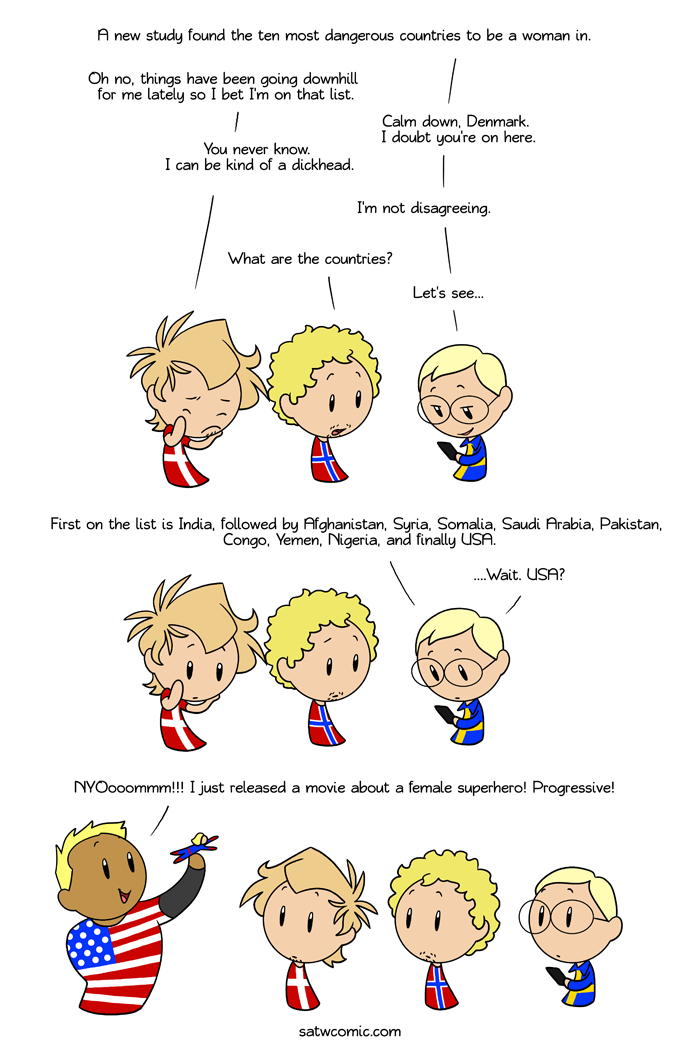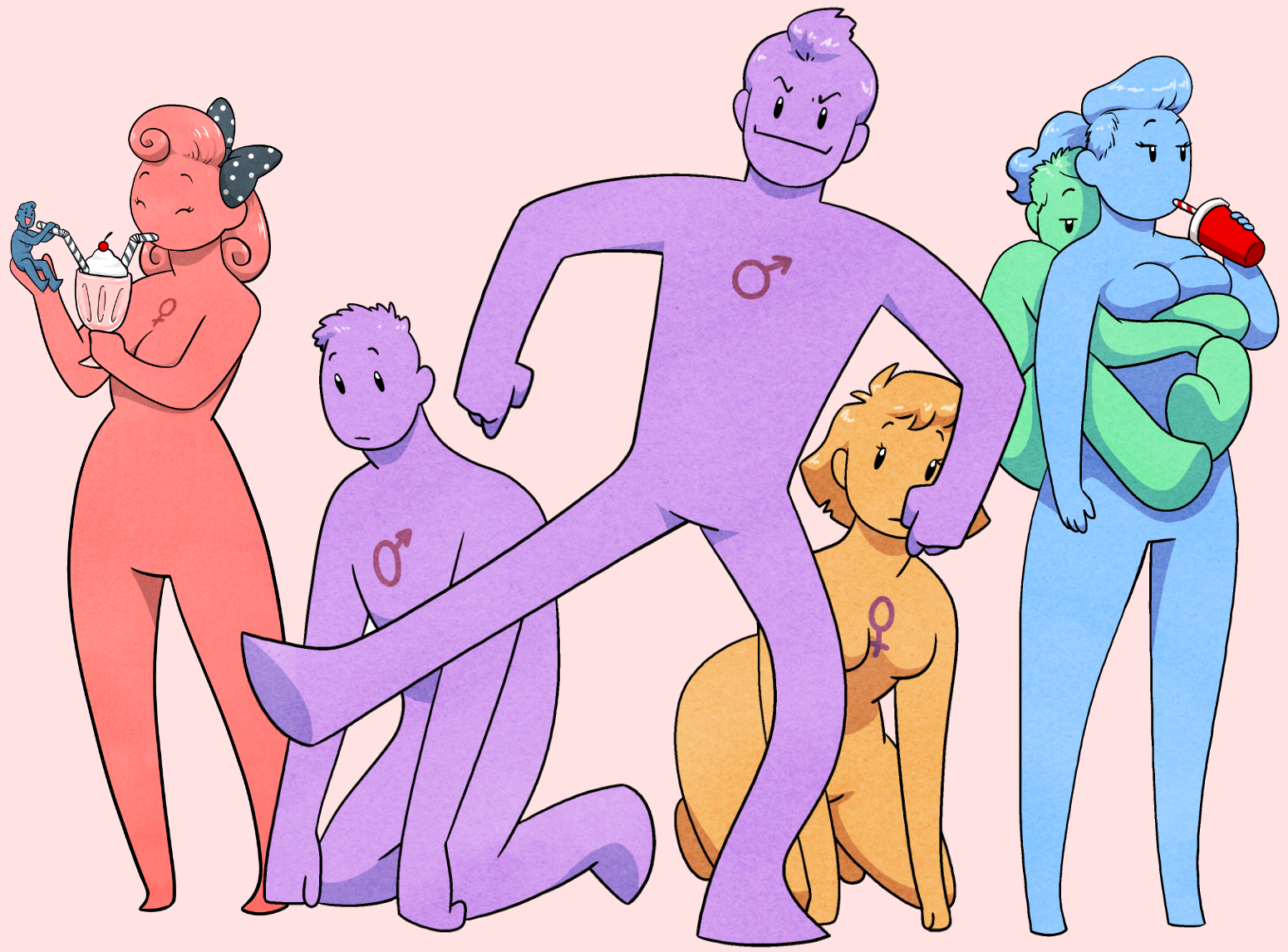Santeyan
7 years ago #9812789
21
6
I'm sorry but I call bullshit on this one. In Kazakhstan young girls are kidnapped to be force married. In Mali, young girls have their genitals mutilated to prevent them from ever feeling pleasure. And you're telling me the US is 10th, above those 2 and a few others. Yeaaah no.
7 years ago #9812731
14
4
This study is done by an american. They love to be in top 10s.
Joke aside, the americans take 1st place in outrage. The love to be outraged by anything; i think they are capable to release such studies with outraging results so the they can have something to be outraged about. I bet there isn't any raw data about the scientific method by which this "study" was conducted.
Joke aside, the americans take 1st place in outrage. The love to be outraged by anything; i think they are capable to release such studies with outraging results so the they can have something to be outraged about. I bet there isn't any raw data about the scientific method by which this "study" was conducted.
7 years ago #9812936
10
1
Everyone's upset about the US being on the list but I looked it up and the list is specifically in terms of sexual violence, harassment, and being coerced into sex. I don't think they count genital mutilation as part of it. Also, the US was bumped up due to all of the exposure to these issues from the #MeToo and Time's Up campaigns, so it's only the more quantifiable reports that are worse. It's still rather disingenuous of the study, though.
7 years ago #9812787
10
2
Was that a poll among 548 female experts from the USA? There is 30 countries where people practice female genital mutilation regularly according to the WHO and that's just barely scratching the surface of awful practices that happen around the world. I get it that the USA has a pretty poor human rights record for a developed country but you need to keep it in perspective.
7 years ago #9812786
10
3
It's a bird!
It's a plane!
It's a survery with questionable date anylysis!
No really,call me skeptical but on that list we only have 3rd world countries, then all of a sudden you have a first world country?No one else thinks is this at least questionable in the way they collect the data?
It's a plane!
It's a survery with questionable date anylysis!
No really,call me skeptical but on that list we only have 3rd world countries, then all of a sudden you have a first world country?No one else thinks is this at least questionable in the way they collect the data?
7 years ago #9813053
8
0
I live in the USA and I've been to some different countries for both business and pleasure - Canada, Mexico, Belize, India, Egypt, England, France, Holland, Ireland, Greece, Bimini... anyway, my experience, for what it's worth - the US can be sexist but I don't see it as dangerous. In India, women in rural areas will go to the bathroom in a field rather than risk public restrooms because of the danger of being ambushed and raped. I've never had to worry about that in the US. When I was working on my degree, I would sometimes walk from the lab late at night and was never bothered, though if I had been worried, the campus police were available to escort women home.
Now, at the same university, there was a frat culture where we knew that the drinks might be overly-alcoholic, because frat boys wanted to get into girls' panties. So when I went to those parties, I went with friends, and we'd keep an eye on each other. This was over 20 years ago and there has been a growing awareness of how toxic that culture is. However, even back in those days, I never had any issues at dorm parties or other gatherings except for frat parties at a few of the frat houses - it wasn't even all the frat houses, just a few that had a bad reputation. And I would say 95% of the men were not that way - I dated a LOT in college and only had one incident where the guy was not respectful. Whereas from talking to friends from Islamic countries - the percentage of men who see women as prey is much higher and in places like S. Africa the rate of rape is much, much higher.
As far as traveling alone - I felt perfectly safe traveling all over the US, Canada, Greece, England, etc. There are places to avoid (such as the red light district in any large city or the South side of Chicago) but for the most part, I was never harassed or bothered. If anything, I'd find friendly people talk to me when I traveled alone in the US or Europe, never had problems when asking for directions or for a recommendation of where to stay or eat. However, from talking to friends, this is not safe when traveling in parts of Asia or Africa. In the US, I could also wear shorts or other revealing clothes and I might get a wolf whistle or some other annoying verbal attention but I never felt unsafe, whereas when I wore something a little revealing in Egypt I felt very unsafe.
I have driven my car cross country in the US as a single woman, no problems. Sorta doubt I could do that in most of the Islamic world. I have women friends who have hiked the Appalachian Trail in groups of just 2 or 3 women - no problems. So as a woman in the US, you can go backpacking, camping, etc. I also have been able to do all the stuff that independent women should be able to do - open a bank account, buy a house, etc. I did not face discrimination when hired for a job in engineering in the US but I did face some discrimination when it came to promotions... but that was in specific companies. When I changed to other companies, that issue went away.
I guess my point is - the US is not perfect, it still has a way to go, but overall I think I get a pretty fair shake as a woman. I feel safe except in a few places (where men would also not feel safe), I can go to a bar by myself, make and manage my own money, travel independently, and so on. There are definitely areas the US needs to become more equal but there are some really good signs that the US is pretty good - lots of women from other countries try to immigrate to the US, and will preferentially marry American men vs. men from their own country. It's because they have more freedom and rights in the US and because their American husbands treat women with more respect. For example, my American husband did more than half the housework when we were both working.
Having traveled in India and having friends and relatives from the Philippines, Pakistan, S. Korea, Japan, China, Colombia, Peru, parts of Africa, etc., I have seen the differences in the expectations of these cultures for women vs. my experience as an American.
One thing that should not be minimized - rape is probably reported more in the US than it is in places like India or the Islamic world. In places like Dubai, when a woman reports a rape, unless there are 4 male witnesses she could be charged with having sex outside of marriage. I was reading an article about a woman who was raped while working at a hotel in Dubai, she was an Australian - and her friends told her not to report the rape. She did, figuring, since she'd fought the attacker and had bruises and so on, that they would realize she was attacked and the sex was not consensual. But she ended up in jail. There are many reports of this kind of thing happening in the Islamic world.
In the US, it's bad enough for rape victims but at least you won't end up in jail for reporting a rape.
Again, not saying the US is the best. There are still areas the US can improve and should improve. There are still misogynistic men and bad attitudes. But I would really want to dig into the statistics of any survey that put the US behind most of sub-Sahara Africa and the Islamic world when it comes to treatment of women... and maybe I am wrong, not going to say I know everything or am an expert, just giving my opinion.
Now, at the same university, there was a frat culture where we knew that the drinks might be overly-alcoholic, because frat boys wanted to get into girls' panties. So when I went to those parties, I went with friends, and we'd keep an eye on each other. This was over 20 years ago and there has been a growing awareness of how toxic that culture is. However, even back in those days, I never had any issues at dorm parties or other gatherings except for frat parties at a few of the frat houses - it wasn't even all the frat houses, just a few that had a bad reputation. And I would say 95% of the men were not that way - I dated a LOT in college and only had one incident where the guy was not respectful. Whereas from talking to friends from Islamic countries - the percentage of men who see women as prey is much higher and in places like S. Africa the rate of rape is much, much higher.
As far as traveling alone - I felt perfectly safe traveling all over the US, Canada, Greece, England, etc. There are places to avoid (such as the red light district in any large city or the South side of Chicago) but for the most part, I was never harassed or bothered. If anything, I'd find friendly people talk to me when I traveled alone in the US or Europe, never had problems when asking for directions or for a recommendation of where to stay or eat. However, from talking to friends, this is not safe when traveling in parts of Asia or Africa. In the US, I could also wear shorts or other revealing clothes and I might get a wolf whistle or some other annoying verbal attention but I never felt unsafe, whereas when I wore something a little revealing in Egypt I felt very unsafe.
I have driven my car cross country in the US as a single woman, no problems. Sorta doubt I could do that in most of the Islamic world. I have women friends who have hiked the Appalachian Trail in groups of just 2 or 3 women - no problems. So as a woman in the US, you can go backpacking, camping, etc. I also have been able to do all the stuff that independent women should be able to do - open a bank account, buy a house, etc. I did not face discrimination when hired for a job in engineering in the US but I did face some discrimination when it came to promotions... but that was in specific companies. When I changed to other companies, that issue went away.
I guess my point is - the US is not perfect, it still has a way to go, but overall I think I get a pretty fair shake as a woman. I feel safe except in a few places (where men would also not feel safe), I can go to a bar by myself, make and manage my own money, travel independently, and so on. There are definitely areas the US needs to become more equal but there are some really good signs that the US is pretty good - lots of women from other countries try to immigrate to the US, and will preferentially marry American men vs. men from their own country. It's because they have more freedom and rights in the US and because their American husbands treat women with more respect. For example, my American husband did more than half the housework when we were both working.
Having traveled in India and having friends and relatives from the Philippines, Pakistan, S. Korea, Japan, China, Colombia, Peru, parts of Africa, etc., I have seen the differences in the expectations of these cultures for women vs. my experience as an American.
One thing that should not be minimized - rape is probably reported more in the US than it is in places like India or the Islamic world. In places like Dubai, when a woman reports a rape, unless there are 4 male witnesses she could be charged with having sex outside of marriage. I was reading an article about a woman who was raped while working at a hotel in Dubai, she was an Australian - and her friends told her not to report the rape. She did, figuring, since she'd fought the attacker and had bruises and so on, that they would realize she was attacked and the sex was not consensual. But she ended up in jail. There are many reports of this kind of thing happening in the Islamic world.
In the US, it's bad enough for rape victims but at least you won't end up in jail for reporting a rape.
Again, not saying the US is the best. There are still areas the US can improve and should improve. There are still misogynistic men and bad attitudes. But I would really want to dig into the statistics of any survey that put the US behind most of sub-Sahara Africa and the Islamic world when it comes to treatment of women... and maybe I am wrong, not going to say I know everything or am an expert, just giving my opinion.
7 years ago #9814104
7
2
I think the numbers that made up the data for this survey are from reported crimes only. The US is seeing a lot more reports of sexual assault now that victims have more support (we’ve also seen a few gender-based killing sprees within the last few years, which are throwing the numbers off). We certainly are no where near perfect, but i have a hard time believing that it’s worse here than in Japan (where more sexual assaults happen, but they are not reported), or Honduras (where murders of women are under-reported because their remains haven’t been found and identified), just to name two examples.
The people who did this study might also be looking specifically at women’s healthcare, which the US lags far behind in, compared to other developed nations (fun fact: the US has the highest maternal death rate of any developed nation, and the only one that is increasing). Add the fact that poor women of color are far less likely to be able to afford healthcare or have a job that pays for it, and i can see where this study is coming from, even though it is incomplete.
All in all, I think that the worldwide gender gap report (https://www.weforum.org/reports/the-global-gender-gap-report-2018) is a much more accurate study of gender equality around the globe. The US ranks number 49 on that list, which sounds about right (better than most third world countries, but at the bottom of the stack when compared to other first world ones).
The people who did this study might also be looking specifically at women’s healthcare, which the US lags far behind in, compared to other developed nations (fun fact: the US has the highest maternal death rate of any developed nation, and the only one that is increasing). Add the fact that poor women of color are far less likely to be able to afford healthcare or have a job that pays for it, and i can see where this study is coming from, even though it is incomplete.
All in all, I think that the worldwide gender gap report (https://www.weforum.org/reports/the-global-gender-gap-report-2018) is a much more accurate study of gender equality around the globe. The US ranks number 49 on that list, which sounds about right (better than most third world countries, but at the bottom of the stack when compared to other first world ones).
Add comment: Please Sign in or create an accout to comment.




 Support the comic on
Support the comic on 

































